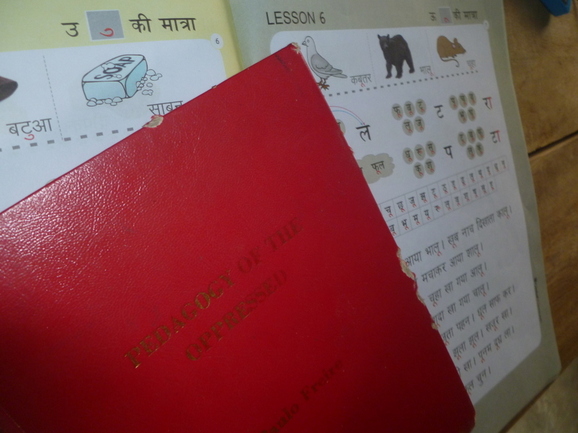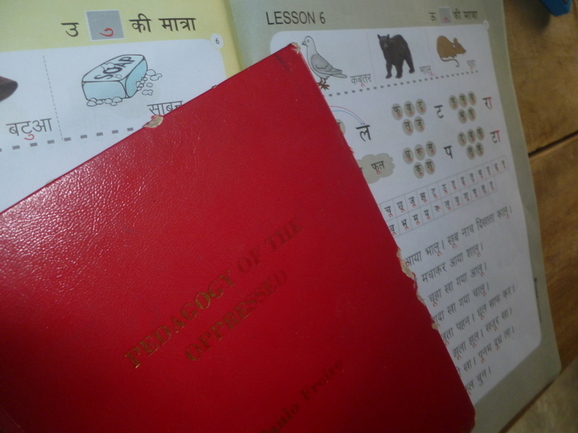In our slum, we see this need for wholeness, and we see the link between illiteracy and oppression. Not being able to fill out a form, to read a prescription, or even to recognize your own name makes you vulnerable to extortion and deceit. It makes it impossible for you to claim your rights (if you can figure out what they are in the first place). It means that you’ll live in unquestioning fear of the police, and bribe them to do what they’re already paid to do, or to refrain from doing what is illegal for them to do. It also means that you’ll have to pay thousands or rupees in “baksheesh” to doctors, nurses, and even cleaning people in order to get a “free” surgery at a government hospital, without ever raising your voice in protest, lest the powerful people get angry and refuse to treat you at all.
This same sense of powerlessness, engendered by lack of education, is a big reason why so many of the skinny, malnourished children we know work long hours at tedious manual jobs polishing furniture in factories owned by fat, wealthy owners who enjoy big profit margins from exporting the finished product. These owners call the expendable, underpaid laborers who create their wealth “dirty” and “cheap”, looking down on them for their ignorance and low station in society.
Meanwhile, the illiterate widows we know travel on foot from their bamboo and plastic shacks to the flashy apartments of the wealthy to wash dishes and clean floors for a few cents a day, knowing that they can’t afford to ask for a fair wage because so many other, more desperate women from the villages are willing to take their places at even lower pay. Their employers give them bonuses, food, or hand-me-down clothes at holidays and imagine themselves to be generous benefactors; the domestic helpers gratefully accept this false charity because they consider themselves helpless and unimportant, and they count themselves fortunate to have attached themselves to such important people who sometimes, on a whim, toss them a bone. In all of these situations, the rich consider themselves divinely ordained to privilege and power over others while the poor consider themselves powerless dependents. Everyone involved ends up with a distorted view of themselves, and no one’s humanity is left in tact.
Reading Pedagogy of the Oppressed, I love the connections between Freire’s concept of education as human liberation and Jesus’ teachings about the role of the oppressed in the Kingdom of God. The book sheds light on what Jesus the servant-King meant when he declared that it is the poor to whom the kingdom belongs: it belongs to the poor because they are the only ones capable of ushering it in through the love and radical forgiveness of their oppressors. Freire writes that “the oppressed must not, in seeking to regain their humanity… become in turn oppressors of the oppressors, but rather restorers of the humanity of both.” The special mission of the oppressed throughout history is to “liberate themselves and their oppressors as well” because those “who oppress, exploit, and rape by virtue of their power, cannot find in this power the strength to liberate either the oppressed or themselves. Only power that springs from the weakness of the oppressed will be sufficiently strong to free both.” The power that springs from weakness is love, and it is exemplified by Jesus in his reliance on forgiveness rather than vengeance to overcome the world.
So the point of marginalized people learning to read isn’t just to open up job opportunities, although literacy does do that. The point is to change the way that the poor perceive themselves. Education should be a process through which “each man wins back his right to say his own word, to name the world.” It should be a process through which the poor begin to think critically about reality instead of just accepting whatever interpretation of reality has been handed on to them from someone else; a growing realization that they, too, are “creators of culture, and that all their work can be creative. ‘I work, and working I transform the world.’” The point of teaching literacy is to help the oppressed recognize the transformative power within themselves.
*All quotes are taken from Pedagogy of the Oppressed, Paulo Freire, 1970

